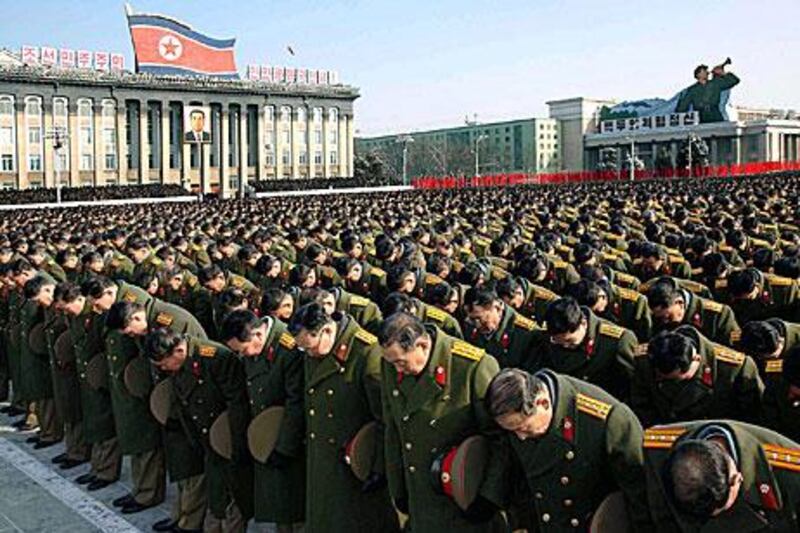BEIJING // Kim Jong-un was annointed North Korea’s “Supreme Leader” yesterday as official mourning for his father, “Dear Leader” Kim Jong-il, ended with thousands gathering in Pyongyang, demonstrating the new regime’s control over a nation some feared could slide into turmoil.
Up to 100,000 people, mostly soldiers, packed into Kim Il-sung square for the second day of mourning to hear Kim Jong-il’s 20-something son and heir declared head of “the party, state and army” by Kim Yong-nam, the ceremonial head of state and parliamentary chief.
The young Mr Kim, his 69-year-old father’s third son and designated successor but a political novice, was flanked by senior officials yesterday on a balcony at the Grand People’s Study House overlooking the square.
A three-minute silence ended the mourning, a day after a funeral procession saw tens of thousands crying over the late Kim, even though his 17-years of iron-fisted rule were marked by famine, economic stagnation and harsh treatment of any dissent.
The regime heavyweights flanking Mr Kim yesterday in a show of support and solidarity are set to mentor the young leader - he is in his late 20s but his exact age is uncertain - as he navigates challenges including dealing with international pressure over the country’s nuclear weapons programme.
Immediate concessions on this are unlikely, said John Swenson-Wright, an associate fellow in the Asia Programme at Chatham House, a London-based think tank, with Mr Kim likely to want to consolidate his position by not doing anything that could be seen as undermining North Korea’s military security and his father’s “military-first” policy.
Looming presidential polls in the United States and South Korea also discourage short-term policy changes.
But longer term, with younger members of the ruling elite likely to recognise the benefits of economic engagement with the outside world, “you could envisage a situation in which North Korea gradually opens up”, Mr Swenson-Wright said from Seoul.
Pressure for reform may also come from the general population.
For a long time largely isolated, North Koreans are slowly learning more about the outside world as communications and trade gradually improve across the border with China, and they are realising neighbouring countries are far more prosperous.
“North Korea should show some positive developments in terms of the economy, otherwise the new government may have very serious challenges from the public,” said Seo Jeong-min of Seoul’s Hankuk University of Foreign Studies.
dbardsley@thenational.ae






